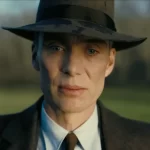Pretend for Me, by David Bax
It’s only a couple of scenes into Liv Ullmann’s Miss Julie when Jessica Chastain’s accent starts to bend under the strain of her emoting and Colin Farrell’s hitched breath and full body shaking has the audience searching the frame for the nearest fainting couch. In mere minutes, Ullmann has whipped her cast into an unsustainable frenzy of scenery chewing and there’s still more than two hours left to go. The fever only gets worse.
Miss Julie is an adaptation of a play from 1888 by August Strindberg. It is peopled by only three characters. Chastain plays Miss Julie, the daughter of a Baron. Farrell is John, the Baron’s valet. And Samantha Morton fills out the cast as Kathleen, the Baron’s cook and a romantic companion of sorts to John. On Midsummer’s Eve, with the Baron away, the bored and willful Miss Julie decides to make sport of John and Kathleen, John especially. She seems to harbor an attraction to her father’s servant but her station makes acknowledging that an impossibility, even to herself. But, as the night wears on, her reservations are dismantled. The turning point, in both the plot and the balance of power, comes when she gives in. Julie and John’s fornication is not shown onscreen but we are given the impression that it is short-lived and unsatisfying. The fireworks come after.
Any remnant of rationality still in the film’s grasp disintegrates in the wake of this carnal turn. Ullmann makes no attempt to render the antiquated power shift relatable to a modern audience, so when Julie becomes hysterical – in every old-fashioned, sexist meaning of the word – it’s like watching extraterrestrials converse. It’s impossible to understand how the surrender of her chastity can have ruined her so thoroughly. There were no witnesses and, as far as she knows, she’s not pregnant. By any clear-eyed appraisal, she still has the upper hand as a member of the higher stratum. Of course, that’s not really the point; this is an allegory about class and social Darwinism. But the thunderous bloviating in the execution obliterates the meaning. Chastain, Farrell and Morton seesaw from sturm to drang and back again, so untethered from reality that one begins to wonder if there’s a gas leak in the Baron’s kitchen.
For what it’s worth, that kitchen – where most of the action unfolds – is beautiful. Ullmann and company filmed on location at Northern Ireland’s Castle Coole. The kitchen windows look out onto a tunnel that leads to the stables; opposite the windows are the stairs that lead to the servant’s quarters. The geography, look and the perfect sounds of the place lend an enrapturing verisimilitude that is jarringly at odds with the film’s laborious, elevated tone. The only bridge between the two worlds is the work of cinematographer Mikhail Krichman (look for him to shine again in a few weeks with the release of Andrey Zvyagintsev’s Leviathan). Krichman makes use of natural or natural-looking light and gives us plenty of wide shots to drink in the location. But he also consistently centers the subjects in his frame despite having a scope aspect ratio to work with. The choice feels odd at first but comes to resemble a mode of direct address, like a reality show confessional or a YouTube vlog. This near-destruction of the fourth wall suggests that only Krichman understands that Miss Julie is not to be taken literally.
It’s very difficult to understand some of the other choices made. Why, for instance, if the story takes place over the course of the night, does the sun never set? It make be Midsummer’s Eve but there is no day in Ireland with a midnight sun. The constancy of the daytime despite the text stating otherwise makes Miss Julie feel like a hallucination or a waking nightmare. But what’s even more difficult, maybe even impossible, to understand is why Ullmann felt compelled to tell this story in this way at all.






























